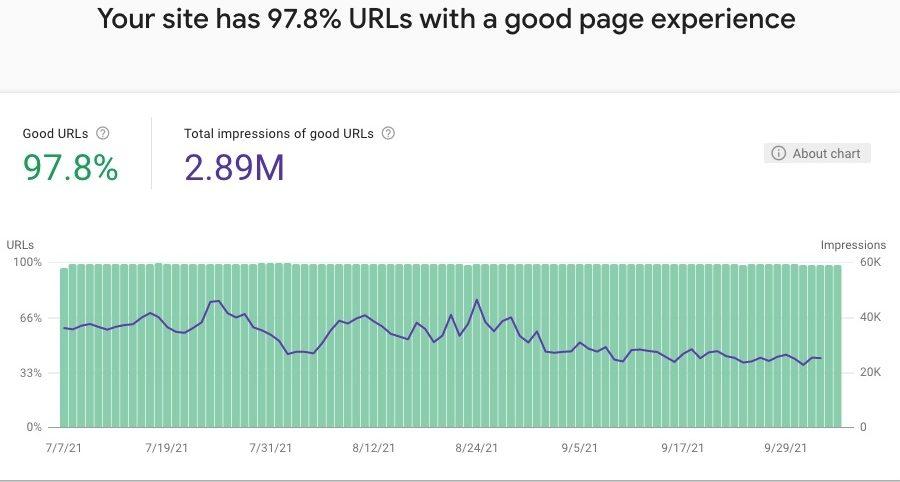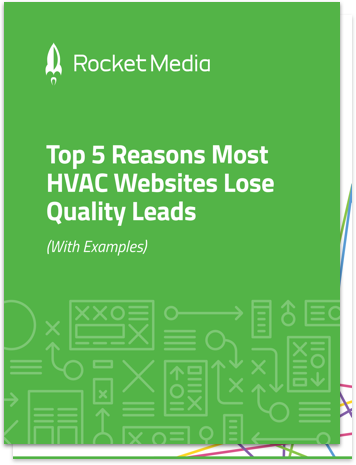How will Google page experience affect website rankings?
on October 05, 2021
Google recently implemented a new set of signals that it considers when delivering search results to users. This algorithm update, called “page experience,” was fully rolled out at the end of August 2021.
So how exactly is “page experience” impacting website rankings? According to Google, these signals measure how users perceive what it is like to interact with a web page “beyond its pure information value.” In short, if your page is determined to have a positive page experience, it could rank higher than similar pages with lower page experience scores.
In this blog, we’ll discuss:
- What exactly “page experience” is and how Google uses it
- Whether it’s more important than the page’s content
- What factors determine a positive page experience

Need help optimizing your website for better Google rankings? Contact Rocket Media and chat with one of our SEO specialists. We’ve helped HVAC and solar companies all over the country stay ahead of Google’s ever-changing algorithms and improve their rankings on Google.
What is page experience?
Page experience is yet another Google algorithm update dedicated to providing valuable experiences to users.
Specifically, page experience is more concerned with the technical aspects of a user’s experience than the quality of the information on the page.
According to Google, page experience is a “set of signals that measure how users perceive the experience of interacting with a web page beyond its pure information value. It includes Core Web Vitals, a set of metrics that measure real-world user experience for loading performance, interactivity, and visual stability of the page. It also includes existing Search signals: mobile-friendliness, safe-browsing, HTTPS, and intrusive interstitial guidelines.”
Basically, page experience is a way for Google to ensure that the pages they deliver in SERPs (Search Engine Results Pages) aren’t providing frustrating or negative experiences, such as long load times, unreadable text and content, or unexpected results movement of page content.
Is page experience more important than quality content?
The short answer? No. Valuable and relevant content is perhaps still the most important factor in how your website pages perform in Google search results. However, in pages with similar quality content, Google will then look to page experience to determine which page will be served higher in SERPS.
For example, suppose Google sees that your website’s “AC repair in Gilbert” page is similar in quality to your competitor’s. In that case, they will see who has a higher page experience score to determine which page is ranked higher when users are searching for this service.
What affects your page experience score?
Google will consider the following as page experience signals:
- Core Web vitals
- Mobile compatibility
- HTTPS Security
- Intrusive Interstitial Guidelines
Core web vitals
Core web vitals are actually a group of metrics that measures the experience a page provides. Your website’s Core Web Vitals report can be found via Search Console.
The metrics that determine your core web vitals score include:
- Large Contentful Paint (LCP) measures the loading speed of the page. Google recommends an LCP of 2.5 seconds or less.
- First Input Delay (FID) measures the time from when a user first interacts with a page to when the browser can process a response to that interaction. For example, FID would measure the time you click a button on the page to when the browser responds with the expected action. Google recommends an FID of less than a hundred milliseconds.
- Cumulative Layout Shift (CLS) measures visual stability. Specifically, Google looks at layout shifts to determine how visually stable the page is. An example of a layout shift is when a visible element (perhaps a button or an image) unexpectedly moves from one location to another. Google recommends that a page have a CLS score of 0.1 or less.
Mobile compatibility
Mobile compatibility refers to how well your page functions and appears on a mobile phone. To test how easily a user can navigate and use your page, check out Google’s mobile-friendly test here.
Google’s mobile-friendly test typically takes under a minute to perform and provides you with a list of any issues that might be impacting your mobile compatibility.
HTTPS Security
HTTPS is an internet communication protocol that protects data. HTTPS protects the confidentiality of data between your computer and the site you’re browsing. Most websites today already provide HTTPS security as a result of Google making this a requirement. Websites that do not provide HTTPS security will display a red ‘Not Secure” warning next to the URL in the browser bar.
Intrusive Interstitial Guidelines
Intrusive Interstitial Guidelines is a set of guidelines that seek to make it easy for users to find the content they’re looking for on your page. A page that displays intrusive interstitials typically provides a less positive experience for users than pages with little to no intrusive interstitials.
The main examples of intrusive interstitials are annoying pop-up ads or general pop-up content that obstructs or denies access to the main page content until a user dismisses it.
Need help improving your website rankings?
At Rocket Media, we know that content is king. That’s why we’ve helped HVAC and solar companies all over the U.S. improve their website rankings.
To learn more about how we can help your business succeed, just drop us a line or call us at (800) 339-7305 to chat with one of our SEO specialists today!
Related Articles: HVAC SEO: How Quickly Can I Rank My Website? , Why Are My Competitors Outranking Me on Google?

